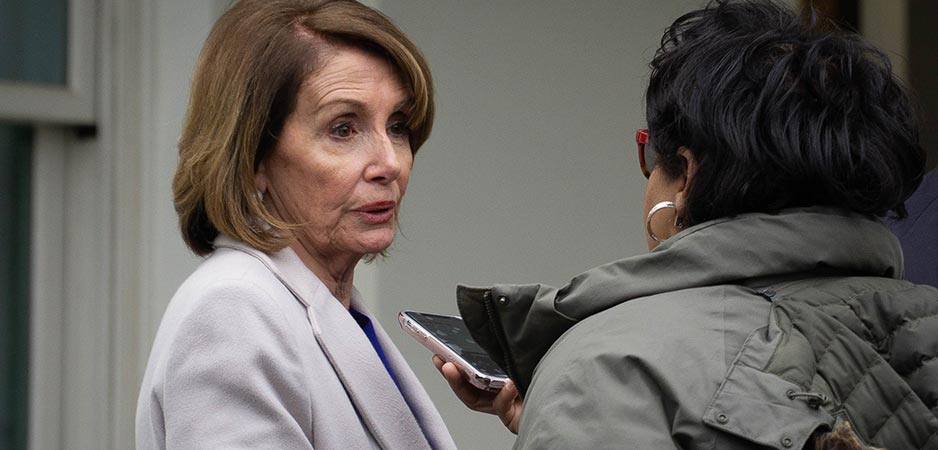As the Democrats cheer themselves on for their noble combat against US President Donald Trump and appear to believe, unanimously, that their sacred mission consists of nothing other than removing him from office and restoring the natural order of a system that works best when presidents don’t tweet and the public pays little attention to the way they are being governed, Politico notices a deep rift that threatens the party’s unity.
The only serious policy rift visible on stage among the 10 Democratic presidential hopefuls who participated in last week’s televised debate concerned the choice of a hybrid system of health care. This is one that maintains private health insurance as opposed to a single-payer system, often referred to as “Medicare for all” (and which Republicans call “socialized medicine” and the rest of the developed world calls “life as usual”).
Politico highlights the dilemma of a party part of which believes it must show it has the guts to do things differently, while the other part wants to reassure the voters that it will only do what can be considered “reasonable,” tame and unprovocative, in contrast with Trump, the provocateur-in-chief. Impeaching Trump would be seen as “divisive” and provocative. But most of all we learn: “Vulnerable House Democrats fear the party’s drive toward impeachment will undercut them in 2020.”
Here is today’s 3D definition:
Undercut:
Remove the basis on which something is built, a prospect that inspires fear even when there is no solid basis in the first place
Contextual Note
The Democratic Party’s progressives — comprising both young (the Squad) and old (Bernie Sanders, Elizabeth Warren) — have earned the media’s spotlight by militating for systemic change and calling attention to a host of ambient evils. In contrast, the centrist legislators referred to in the article studiously avoid identifying with and defending any significant hot-button policy positions. This reduces their fear of failing to deliver on their timid agenda of business as usual piloted by the speaker of the House, Nancy Pelosi. They do, however, fear being undercut on one thing: not being reelected. That is the one issue worth going to the media and fighting for.
These same centrist Democrats don’t appear to fear the prospect of war (or rather more war than they already have, this time with Iran). Some, such as Senator Chris Coons, even seem to welcome it. The centrists don’t seem to fear the ongoing effects of a justice system that imprisons millions of people every year and serves to criminalize an entire race. After all, it was a Democratic president — Bill Clinton — along with Senator Joe Biden, the current Democratic frontrunner in the presidential primaries, who defined its contours in 1994.
Most of all, they don’t fear the influence of money on politics, because that was the key to their getting elected in the first place. Their legislative record shows that they don’t fear many other obvious, deeply ingrained social ills that tend to get worse as the years go by, such as increasing inequality, crushing and stultifying student debt or even an opioid crisis that is a symptom not just of commercial abuse by cynical pharmaceutical firms, but more particularly of a certain deepening malaise of civilization itself and seriously eroded social values.
Politics is a full-time, year-round game of getting elected and then getting reelected. Anything that undercuts that prospect is bad. Any objectively bad thing (war, injustice, poverty, torture, etc.) that comforts the prospect of being reelected because it responds to the voters’ wishes or prejudices is considered good, though not necessarily deemed desirable in itself.
That’s why George W. Bush was proud of calling himself a “war president” in February 2004. It’s not that he thought war was good, but that in an election year being seen as a war president was a feather in his cap. That’s why Barack Obama was thrilled to remind his public that he had killed Osama bin Laden and why Hillary Clinton could proudly announce, with a smile and a smirk, with regard to Libya and the brutal murder of Libyan leader Muammar Gaddafi: “[W]e came, we saw, he died.” Killing normally doesn’t give Democrats pleasure, but taking credit for killing the right enemies certainly helps with getting elected.
Historical Note
For most of the past 50 years, the Democrats have never been able to work out their relationship with their own history. Under President Franklin D. Roosevelt, the Democrats identified with the common people and radically reformed the capitalist system in their interests. But the party also embraced the racist American South, states on which their electoral success depended. Roosevelt was elected to a third and then a fourth term because he was a “war president.”
The war economy is what finally allowed the US to emerge from the doldrums of the Great Depression. The Democrats thus found themselves, like the rest of the nation, consciously or unconsciously committed to a militarized economy. They joined the always more jingoistic Republicans in promoting the fears and obsessions of the Cold War that justified continuing to develop a militarized economy.
The youthful “New Frontier” reformer, John F. Kennedy, continued as an adamant Cold warrior until his assassination in 1963. And though war (in Vietnam) is what finally undid Lyndon Johnson’s presidency, the Democrats have remained ever since committed to perpetuating the military-industrial complex that produced not only jobs, but also the technology that could be transferred to new sectors of the consumer economy. At the same time, it ensured that the US would maintain uncontested leadership in the growing marketplace for professional and consumer technology, dictating norms of technology and even behavior to the rest of the planet.
The current tribe of Democratic presidential candidates, including the two most prominent progressive — Bernie Sanders and Elizabeth Warren — have been wary of even suggesting that US military budgets be scaled down and foreign policy readjusted to pull back from its implicit goal of imperial reach and control. They focus, as Democrats since Roosevelt have always done, on adapting the internal rules of capitalism to reduce the role of greed as the principal motivating factor driving the economy.
The progressives promote concrete measures — taxing corporations and the rich, deprivatizing health care, canceling student debt, offering free college, etc. — all of which are painted by Republicans as sources of cost and new taxation. Nevertheless, for many, these reforms appeal to the growing sense among the public, and especially the young, that if nothing is done, society itself may collapse.
The centrists, focused on reelection, sense the danger of even suggesting measures that imply raising anyone’s taxes. Their strategy consists of appearing inclusive (showing respect for every type of identity) and sympathetic to people’s local concerns. Once elected, they can be counted on to support reforms that will “help people” or “address problems” but which will rarely if ever challenge deficiencies in the structure of the economy or the political system.
The Politico article bears the title: “Moderate Democrats warn Pelosi of impeachment obsession.” Centrist Democrats weren’t particularly concerned by their party’s absurd obsession with “Russiagate,” whose outcome — had their suspicions about Trump’s collusion with Russia in the 2016 election been confirmed — should have led to his impeachment. But they now fear that focusing on impeachment will force the nation to make more complex moral assessments of political behavior that could call into question the corrupt core of the current system.
Trump’s sins have nothing to do with collusion with foreign governments. They have everything to do with greed, influence trafficking and abuse of power. These happen to be the pillars of the current economic and political system. Trump does what everyone else does but on a scale that matches his inflated ego and with an openness that embarrasses the political class, generally adept at hiding the everyday reality of corruption.
President Trump’s personality has made visible the corruption and perverse political values that have underpinned the system for decades. That growing visibility is the factor that threatens to undercut the political careers of centrist Democrats and possibly the entire corrupt system. A good reason to prefer talking about other things.
*[In the age of Oscar Wilde and Mark Twain, another American wit, the journalist Ambrose Bierce, produced a series of satirical definitions of commonly used terms, throwing light on their hidden meanings in real discourse. Bierce eventually collected and published them as a book, The Devil’s Dictionary, in 1911. We have shamelessly appropriated his title in the interest of continuing his wholesome pedagogical effort to enlighten generations of readers of the news.]
The views expressed in this article are the author’s own and do not necessarily reflect Fair Observer’s editorial policy.
Support Fair Observer
We rely on your support for our independence, diversity and quality.
For more than 10 years, Fair Observer has been free, fair and independent. No billionaire owns us, no advertisers control us. We are a reader-supported nonprofit. Unlike many other publications, we keep our content free for readers regardless of where they live or whether they can afford to pay. We have no paywalls and no ads.
In the post-truth era of fake news, echo chambers and filter bubbles, we publish a plurality of perspectives from around the world. Anyone can publish with us, but everyone goes through a rigorous editorial process. So, you get fact-checked, well-reasoned content instead of noise.
We publish 2,500+ voices from 90+ countries. We also conduct education and training programs
on subjects ranging from digital media and journalism to writing and critical thinking. This
doesn’t come cheap. Servers, editors, trainers and web developers cost
money.
Please consider supporting us on a regular basis as a recurring donor or a
sustaining member.
Will you support FO’s journalism?
We rely on your support for our independence, diversity and quality.






